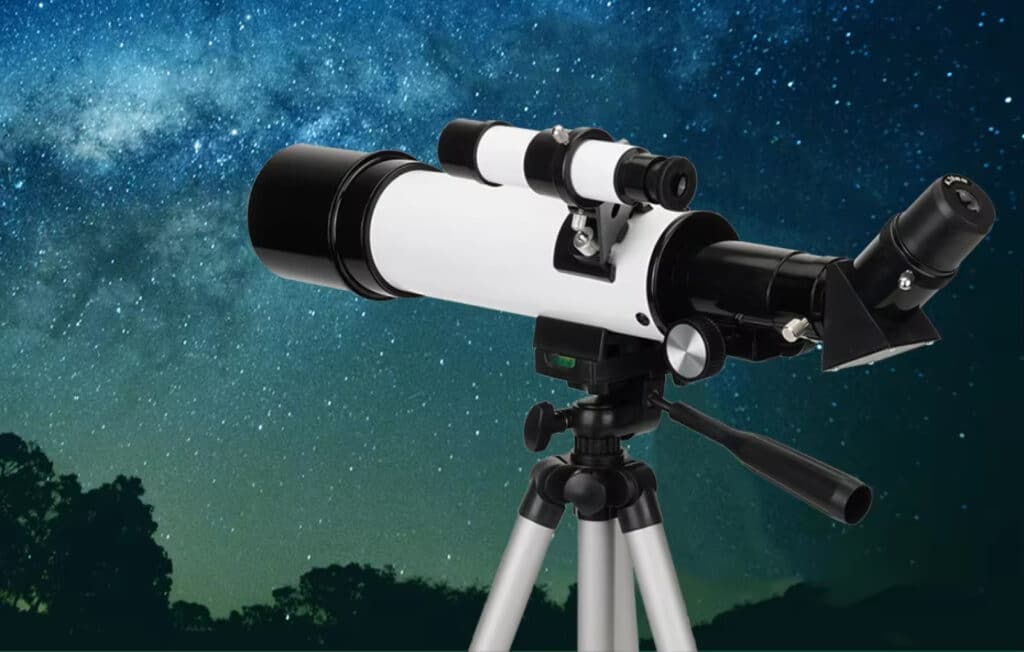
By Gregg Cook

Embarking on an astronomical journey starts with choosing the right equipment. As passionate astronomers and tech enthusiasts, we understand the excitement and challenges of selecting your first telescope 🔭.
The vast universe beckons, but finding the perfect starting point can feel overwhelming. That’s why we’ve carefully curated this list of the best 5 telescopes for beginners to help you make an informed decision.
Our team has spent countless hours testing and evaluating various models to ensure you get the most value for your investment. We focus on user-friendly features and optical quality that will enhance your stargazing experience ⭐.
Whether you’re dreaming of exploring lunar craters or catching a glimpse of distant planets, we’ve got you covered. Our comprehensive guide will walk you through the essential features and specifications you need to know 🌟.
We assess the clarity and brightness of images through extensive nighttime testing sessions.
Each telescope undergoes multiple assembly tests to ensure it's truly beginner-friendly.
We evaluate materials, durability, and stability under various weather conditions.
Our team analyzes the features-to-price ratio to ensure you get the best return on investment.
The Celestrop stands out as a remarkable refractor telescope that combines premium features with user-friendly design 🔭.
With its 60mm aperture and 400mm focal length, this telescope delivers crystal-clear views of celestial objects, making it perfect for beginners exploring the night sky.
The advanced multi-coated glass elements ensure superior light transmission and image clarity 🌟. Its metal focusing mount with double locking screws provides precise targeting and stable viewing experiences. The K20mm 1.25-inch eyepiece offers medium power magnification, ideal for observing both planetary and lunar details.
Equipped with a lightweight aluminum alloy tripod and a comfortable 45° correct image system ✨, this telescope offers exceptional portability without compromising on performance. The IPX6 water resistance rating adds durability for outdoor viewing sessions.
The included 5x24mm finder scope makes target acquisition quick and effortless for beginners.
As one of the best telescopes for beginners in 2025, the Celestrop features a professional-grade optical system 🎯 that makes it perfect for both celestial and terrestrial observations.
With a progressive viewing capability from 150mm to 400mm and a wide 50° field of view, users can enjoy everything from detailed moon craters to distant planetary features with remarkable clarity.
The Celestrop has earned its top spot among beginner telescopes with its exceptional optical performance and user-friendly design. With free shipping and 24/7 customer support, this telescope offers everything needed for an amazing stargazing experience. Don’t miss out on this top-rated telescope – EXPLORE THE COSMOS NOW!
The Celestron AstroMaster 130EQ-MD positions itself as a compelling option in the intermediate beginner telescope market. This Newtonian reflector combines powerful specifications with user-friendly features, making it suitable for those ready to explore astronomy more seriously.
With its 130mm aperture and 650mm focal length, this telescope delivers impressive light-gathering capability (345x compared to human eye).
The optical system features fully-coated glass optics and a precise focusing mechanism, enabling clear views of planets, lunar details, and brighter deep-sky objects.
The telescope comes equipped with a German equatorial mount featuring dual-axis slow-motion controls and a motor drive system powered by a 9V battery. This setup enables precise tracking of celestial objects, though mastering the mount requires some learning investment.
The included accessory package offers comprehensive value, featuring two eyepieces (20mm and 10mm) providing 33x and 65x magnification respectively, a StarPointer red dot finderscope, and access to Starry Night astronomy software.
The pre-assembled tripod with 1.25-inch steel tube legs provides essential stability for extended viewing sessions.
The Orion StarBlast emerges as a popular choice among stargazing enthusiasts seeking a reliable beginner telescope in the mid-range market. This tabletop reflector telescope features a substantial 4.5-inch (114mm) aperture and a 450mm focal length, offering impressive light-gathering capability for deep-sky observations.
Built with premium parabolic optics and enhanced reflective coatings, this compact powerhouse delivers sharp, high-contrast views of celestial objects.
The sturdy tabletop base with altitude-azimuth adjustment provides exceptional stability while maintaining ease of use. The EZ Finder II reflex sight system significantly simplifies target acquisition for beginners.
The telescope includes two Explorer II 1.25-inch Kellner eyepieces (17mm and 6mm), providing magnifications of 26x and 75x respectively. The quick collimation system makes maintenance straightforward, while the compact form factor ensures excellent portability without compromising observation quality.
Although designed for beginners, this telescope offers features suitable for intermediate astronomers. The wide-field views and intuitive operation make it particularly effective for observing star clusters, nebulae, and lunar details, though some users might prefer additional eyepieces for enhanced versatility.
The Meade StarPro AZ stands out in the premium segment of the beginner telescope market with its sophisticated features. This advanced refractor telescope boasts an 80mm aperture and 900mm focal length, delivering exceptional clarity for planetary and deep-sky observation.
The telescope’s fully multi-coated optics and premium low-dispersion glass minimize chromatic aberration, resulting in sharp, color-accurate images. Its robust aluminum construction and professional-grade rack-and-pinion focuser ensure precise adjustments and lasting durability. The slow-motion control system allows for smooth tracking of celestial objects.
Equipped with two Super Plössl eyepieces (26mm and 9.7mm) and a 2x Barlow lens, it offers versatile magnification options from 35x to 185x. The red dot viewfinder and smartphone adapter enhance the viewing experience, making astrophotography accessible to beginners.
As a high-end telescope for beginners, it provides exceptional optical performance and build quality. The adjustable-height aluminum tripod and accessory tray offer stability and convenience, though some features may exceed novice users’ initial needs.
The Explore Scientific FirstLight delivers premium performance for enthusiasts seeking a powerful dobsonian telescope. With its impressive 130mm aperture and 650mm focal length, this reflector telescope excels at gathering light for detailed views of both planetary and deep-space objects.
The telescope’s premium parabolic primary mirror and enhanced aluminum coatings ensure exceptional light transmission and minimal distortion.
The robust single-arm mount features dual-speed Crayford-style focuser for precise adjustments, while the innovative tension control system maintains collimation during extended viewing sessions.
Featuring a comprehensive accessory package, including two EXOS Plössl eyepieces (25mm and 10mm) and a 2-inch dual-speed focuser, this telescope offers versatile magnification options from 26x to 130x. The integrated cooling fan and large 30mm secondary mirror optimize image clarity and contrast.
As a high-quality beginner telescope, it balances advanced features with user-friendly operation. The sturdy aluminum dobsonian base provides smooth azimuth movement and altitude adjustment, though the solid construction results in a heavier overall package compared to entry-level models.
A Telescope For Beginners is an entry-level optical instrument designed specifically for amateur astronomers starting their stargazing journey. These telescopes feature user-friendly designs, manageable aperture sizes, and simplified mounting systems that make them accessible for newcomers while still providing quality views of celestial objects.
These telescopes are perfect for astronomy enthusiasts who are just starting to explore the night sky, families looking to share educational experiences, and curious individuals wanting to observe basic celestial objects like the Moon, planets, and bright star clusters without overwhelming complexity or cost.

Gregg Cook - Research Specialist
© 2023 TopStarSelect, LLC. All Rights Reserved.
Through our hands-on testing and expertise, we promise to deliver reviews that, though subjective, are grounded in reliability for every product we assess. Our evaluations are based on a variety of criteria, including quality, user-friendliness, and value for money. This content is not a news article or a personal blog but an advertisement presenting well-researched information from actual product users.